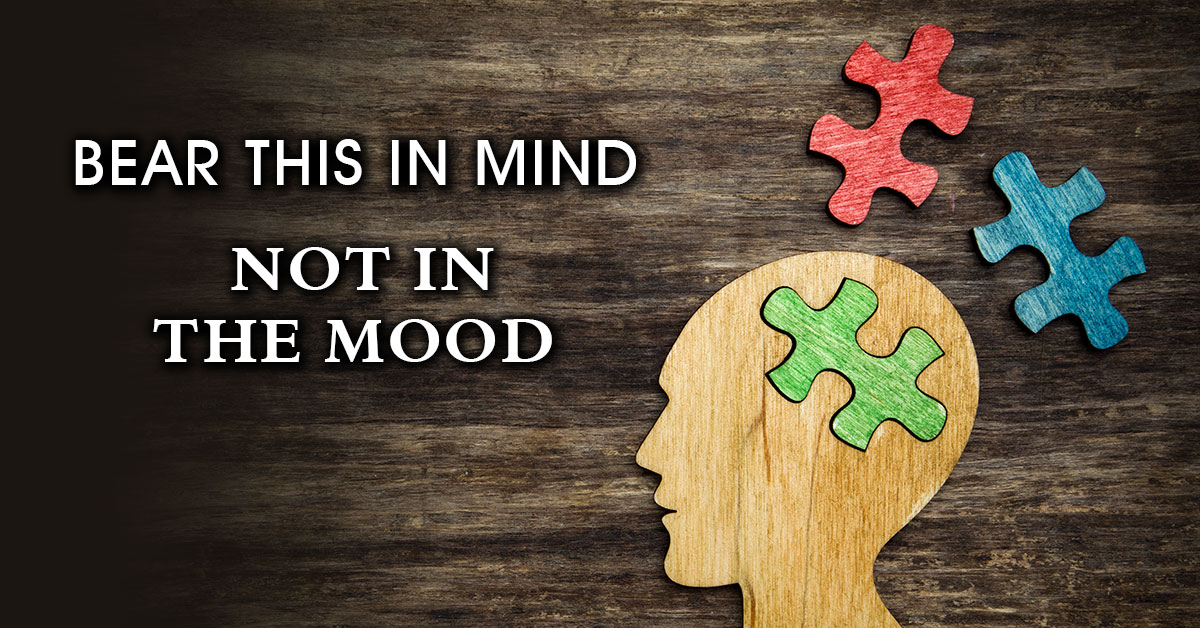BEAR THIS IN MIND – NOT IN THE MOOD

Your brain has a little bunch of cells on each side called the amygdala (say: uh-MIG-duh-luh). The word amygdala is Latin for almond, and that’s what this area looks like. Scientists believe that the amygdala is responsible for emotion. It’s normal to feel all different kinds of emotions, good and bad. Sometimes you might feel a little down, other times you might feel scared or silly or glad. Mood swings are excessive or abrupt changes in your frame of mind. Your mood may suddenly shift from elation and euphoria to extreme sadness or terror, and then onto another emotion. In some cases, mood changes are reactions to your environment or circumstances like employment, financial worries, legal and relationship problems, though the intensity of the mood might seem out of proportion to the significance of the event. In other cases, mood swings may occur for no apparent reason. But being unhappy, having a crap week at work, or getting dumped, isn’t the same thing as being depressed. All of life swings back and forth every day.
GLUM, BUMBED AND BROODING
Major depressive disorder — one of many forms of depression — is much more complicated. There are specific symptoms and signs that determine whether what you’re experiencing is depression or just a case of the Mondays. Major depression is a mood disorder that affects the way you feel about life in general. Having a hopeless or helpless outlook on your life is the most commonly associated symptom of depression. Other feelings may be worthlessness, self-hate, or inappropriate guilt. Common, reoccurring thoughts of depression are vocalized as, “It’s all my fault,” or “What’s the point?” Depression can take the pleasure or enjoyment out of the things you love. A loss of interest or withdrawal from activities that you once looked forward to — sports, hobbies, or going out with friends — is yet another telltale sign of major depression. Major depression can cause periods of crying, sleeping problems and poor appetite. Plus, a decreased sex drive and even impotence. Depression is a cruel disease that can affect anyone. It is very easy, once the symptoms begin, to slide down the black hole of depression where the symptoms spiral off each other making it worse.
UP-DOWN, DOWN-UP, DOWN-DOWN, UP-UP
Years ago, most people had never even heard of bi-polar disorder. Or knew that it was also referred to as manic-depressive disease. The movie Silver Linings Playbook made bi-polar an Oscar worthy disease. It may seem like the difference between mood swings and depression are minimal. But with bi-polar disorder, you can be so depressed that you cannot get out of bed. You can be so depressed that you don’t want to live. You can be so manic, that you spend your retirement fund, buy a horse, sleep with strangers, leave happy relationships and go into debt. The symptoms are severe, and usually irreversible. Some studies show how the brains of people with bipolar disorder may differ from the brains of healthy people or people with other mental disorders. Some research suggests that people with certain genes are more likely to develop bipolar disorder than others. Regrettably for those who suffer, there is no definitive answer at this point, other than trying myriad meds. Which is disillusioning considering it is a lifelong illness.
MAKE A MENTAL NOTE
If you’re feeling foggy or depressed or have trouble sleeping, the problem might not be in your head, but in your hormones. Many issues with hormone imbalances mimic the symptoms of depression. And the best way to find out is to see Stephen A. Goldstein, M.D, F.A.C.S. at Denver Hormone Health. He has spent years, studying the latest research and treating patients with incredibly positive outcomes where they had been beginning to lose hope. When people begin to feel “off”, they too often rush to conventional doctors who rush to prescribe meds, especially antidepressants, which not only can mask the real issue, but also cause bothersome side effects. There are so many hormones that could be the culprit of how you feel: estrogen, testosterone, thyroid, stress hormones…the list goes on. But with simple tests, Dr. Goldstein can pinpoint whether, in fact, it is hormones that are giving you what feel like mental issues. In that case, he creates a tailored plan that makes you feel alert, alive, and in a new frame of mind. Call today.
If you’re looking for relief, it’s a no brainer.
